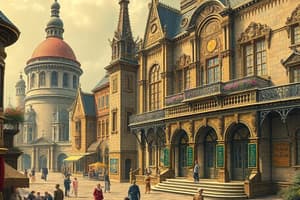Podcast
Questions and Answers
What was a distinct characteristic of Britain's nationalist experience compared to other European states?
What was a distinct characteristic of Britain's nationalist experience compared to other European states?
- A strong sense of imperial identity and a lack of fragmentation (correct)
- A focus on creating a new nation-state
- A series of uprisings against foreign rule
- A strong desire for colonial expansion
What was a key outcome of nationalist movements in Europe?
What was a key outcome of nationalist movements in Europe?
- The dissolution of the British Empire
- The rise of socialist ideologies
- The creation of a unified European state
- The reorganization of European borders, leading to the creation of new nation-states (correct)
Who manipulated the German Confederation to create a unified German state?
Who manipulated the German Confederation to create a unified German state?
- Ottokar Czernin
- Otto von Bismarck (correct)
- Giuseppe Mazzini
- King Victor Emmanuel II
What was a consequence of nationalist rivalries and competitions in Europe?
What was a consequence of nationalist rivalries and competitions in Europe?
What was a result of the break-up of the Ottoman Empire in the Balkans?
What was a result of the break-up of the Ottoman Empire in the Balkans?
What was a characteristic of the Polish Nationalist Movement?
What was a characteristic of the Polish Nationalist Movement?
What fueled nationalist sentiment in Europe during the 19th century?
What fueled nationalist sentiment in Europe during the 19th century?
Which of the following was a key factor in the unification of Italy?
Which of the following was a key factor in the unification of Italy?
What was the outcome of the Franco-Prussian War?
What was the outcome of the Franco-Prussian War?
What was a result of the rise of nationalism in Europe?
What was a result of the rise of nationalism in Europe?
Who inspired nationalist movements across Europe with the ideas of liberty, equality, and fraternity?
Who inspired nationalist movements across Europe with the ideas of liberty, equality, and fraternity?
What was the primary goal of nationalist movements in Europe during the 19th century?
What was the primary goal of nationalist movements in Europe during the 19th century?
Flashcards are hidden until you start studying
Study Notes
Causes of Nationalism
- Cultural and Linguistic Identity: People began to identify with their own culture, language, and history, creating a sense of belonging and shared identity.
- Economic Factors: Industrialization and trade created economic competition, leading to a desire for national unity and protection.
- Political and Social Changes: The French Revolution's ideas of liberty, equality, and fraternity inspired nationalist movements across Europe.
- Romanticism: Emphasis on emotion, folklore, and national heritage fueled nationalist sentiment.
Unification of Italy
- Italian Unification: Process of creating a unified Italian state from various independent kingdoms and city-states.
- Giuseppe Mazzini: Italian nationalist who advocated for a unified Italy, inspired by the French Revolution.
- Giuseppe Garibaldi: Italian general who led military campaigns to unify Italy.
- Count Camillo di Cavour: Prime Minister of Sardinia who played a key role in unifying Italy through diplomacy and strategic alliances.
Unification of Germany
- German Unification: Process of creating a unified German state from various independent kingdoms and city-states.
- Otto von Bismarck: Prussian Prime Minister who unified Germany through a series of wars and diplomatic maneuvers.
- Franco-Prussian War: War between France and Prussia that led to the unification of Germany under Prussian leadership.
- German Confederation: Loose association of German states that Bismarck manipulated to create a unified German state.
Nationalist Movements
- Greek War of Independence: Successful nationalist movement against Ottoman rule, leading to Greek independence.
- Polish Nationalist Movement: Series of uprisings against Russian, Prussian, and Austrian rule, ultimately leading to Polish independence.
- Czech and Slovak Nationalist Movements: Movements for independence from Austro-Hungarian rule, leading to the creation of Czechoslovakia.
Impact of Nationalism on Europe
- Rise of Tensions: Nationalist rivalries and competitions led to increased tensions and conflicts between European states.
- Reorganization of Europe: Nationalist movements led to the redrawing of European borders, creating new nation-states.
- Balkanization: Break-up of the Ottoman Empire, leading to the creation of smaller, independent states in the Balkans.
Strange Case of Britain
- Unique Nationalist Experience: Britain's nationalist movement was characterized by a strong sense of imperial identity and a lack of fragmentation, unlike other European states.
- British Empire: Britain's extensive colonial empire and global influence contributed to a distinctive nationalist experience.
- Lack of Unification: Britain did not require unification, as it was already a unified state, unlike Italy and Germany.
- Nationalist Sentiment: British nationalist sentiment was focused on maintaining and expanding the empire, rather than creating a new nation-state.
Studying That Suits You
Use AI to generate personalized quizzes and flashcards to suit your learning preferences.




